|
|
|
Sort Order |
|
|
|
Items / Page
|
|
|
|
|
|
|
| Srl | Item |
| 1 |
ID:
186872
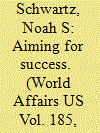

|
|
|
|
|
| Summary/Abstract |
Despite the popularity of the Evidence-Based Policy Making paradigm, scholarly evidence often fails to have an impact in emotional or value-laden policy debates. Consequently, changes to Canada’s gun control laws in recent years have often failed to incorporate scholarly research. This is problematic given that the forces of path dependence impose costs on policy makers who seek to reverse established policies, even if they are dysfunctional. This article lays the theoretical foundations for a Firearms Policy Evaluation Framework, which can be used by scholars, policy makers, advocates, and the public to conduct preliminary evaluations of proposed firearms policies before they become law. The utility of the framework is then demonstrated with an evaluation of the 2020 assault-style weapons ban in Canada, which includes a systematic scoping review of the literature on the impact of assault-weapons bans.
|
|
|
|
|
|
|
|
|
|
|
|
|
|
|
|
| 2 |
ID:
172178


|
|
|
|
|
| Summary/Abstract |
Why do some political radicals—people who believe in using violence for political ends and who may sympathize with local violent groups—not themselves perform violent acts or join violent organizations? This article finds that prior research on terrorism, insurgency, civil war, and ethnic conflict seems to do a poor job of predicting who upon adopting radical political views will actually engage in violence. In fact, there is a great deal of contingency involved in the choice of whether or not to become violent. Employing path dependence, the article treats the radicalizing moment as a “critical juncture,” filled with contingency, but after which actions become more predictable: during this small window of time, radicalized individuals might happen to choose a profession and/or join an organization that is nonviolent, but subsequently become institutionalized as nonviolent actors. The article therefore offers an explanation for how individuals with radical beliefs can be institutionalized as either violent or nonviolent. The study’s findings are based on a content analysis of interviews with 129 nonviolent activists, most of whom exhibited radical beliefs at the time of the interview, and former violent actors, in 12 countries experiencing violent internal conflict.
|
|
|
|
|
|
|
|
|
|
|
|
|
|
|
|
| 3 |
ID:
189866
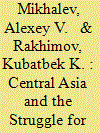

|
|
|
|
|
| Summary/Abstract |
The paper discusses the “struggle for Soviet legacy’ as a key concept for
understanding relations in Central Asia. This struggle is a path of dependent
development, in which the resources and values created in Soviet times
determine interstate relations in the 21st century. The authors argue that in
Central Asia this legacy rests mostly on the mega industries created during
the Soviet era, and national resources and practices of their distribution.
The paper concludes that in fact the struggle for Soviet legacy means
confrontation over the contours of new geoeconomics in Asia.
|
|
|
|
|
|
|
|
|
|
|
|
|
|
|
|
| 4 |
ID:
169413
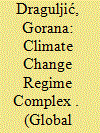

|
|
|
|
|
| Summary/Abstract |
In an era defined by forum shopping, institutional proliferation, and regime complexity, why do global governance arrangements remain relatively stable? This article combines the insights of regime complexity scholarship with historical institutionalism to address this question. It argues that the establishment of international regimes creates winners and losers. States dissatisfied with these arrangements push for institutional change. Regimes nonetheless tend to develop in a path-dependent manner because institutions are resistant to change and the winners under the status quo seek to protect it. Thus, existing governance arrangements exert a centripetal pull, even when states engage in forum shopping and institutional proliferation to generate regime complexity. An examination of path-dependent institutional development in the global climate regime supports the argument.
|
|
|
|
|
|
|
|
|
|
|
|
|
|
|
|
| 5 |
ID:
162444


|
|
|
|
|
| Summary/Abstract |
What are the long-term effects of colonial institutions on insurgency? My article shows the historical origins of insurgency by addressing the puzzle of why the persistent Maoist insurgency, considered to be India’s biggest internal security threat, affects some districts along the central eastern corridor of India but not others. Combining archival and interview data from fieldwork in Maoist zones with an original district-level quantitative data set, I demonstrate that different types of British colonial indirect rule set up the structural conditions of ethnic inequality and state weakness that facilitate emergence of Maoist control. I address the issue of selection bias, by developing a new instrument for the British choice of indirect rule through princely states, based on the exogenous effect of wars in Europe on British decisions in India. This article reconceptualizes colonial indirect rule and also presents new data on rebel control and precolonial rebellions.
|
|
|
|
|
|
|
|
|
|
|
|
|
|
|
|
| 6 |
ID:
138120


|
|
|
|
|
| Summary/Abstract |
This paper argues that policy space ownership dynamics, political and historical institutional variables determine the implementation of reforms advocated within the context of the international transfer of public sector reform models to Africa. Through the case of the Malawi Hospital Autonomy reforms, this paper demonstrates that although policies transferred by international donor organisations to African countries through aid conditionality may be initially adopted so as to secure the much-needed developmental aid, the actual implementation of such reforms is not an automatic process. This is due to contextual factors, which in part include the neo-colonial struggle for policy ownership in the face of conditionality, path dependency tendencies and veto players that are constrained by deeply entrenched political and historical institutional proclivity that lead to policy stability even in the context of coercive policy transfer pressures. Taking a qualitative approach, the analysis combines the use of primary and secondary data. The study findings show that while other African countries successfully implemented such reforms, Malawi has not, due to specific implementation, historical, political and institutional factors.
|
|
|
|
|
|
|
|
|
|
|
|
|
|
|
|
| 7 |
ID:
088260
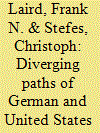

|
|
|
|
|
| Publication |
2009.
|
| Summary/Abstract |
The United States and Germany started out with very similar policies for renewable energy after the energy crisis of the 1970s. By the year 2000 they were on very different policy paths and, as a result, the German renewable energy industry has moved well ahead of that in the United States, both in terms of installed capacity in the country and in terms of creating a highly successful export market. In this paper, we reject some of the conventional explanations for this difference. Instead, these differences arise from the intersection of contingent historical events with the distinctive institutional and social structures that affect policy making in each country. Our analysis of the historical path-dependent dynamics of each country suggests that those who wish to further renewable energy policy in the United States need to take into account these institutional and social factors so that they will better be able to exploit the next set of favorable historical circumstances.
|
|
|
|
|
|
|
|
|
|
|
|
|
|
|
|
| 8 |
ID:
148461
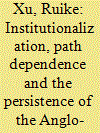

|
|
|
|
|
| Summary/Abstract |
One of the remarkable phenomena in post-Cold War world politics is the persistence of the Anglo-American special relationship (AASR) in spite of recurrent announcement of its death by pessimists. Current scholarship on Anglo-American relations largely draws on interests and sentiments to explain the persistence of the AASR, ignoring other important contributing factors such as institutionalization. This article is the first to give serious consideration to the role of institutionalization in influencing the persistence of the AASR. By using the concept of path dependence, this article argues that the high-level institutionalization in Anglo-American intelligence, nuclear and military relations plays a seminal role in contributing to the persistence of the AASR in the post-Cold War era. The institutionalized intelligence relationship is exemplified by the relationship between the UK's Government Communications Headquarters (GCHQ) and the US's National Security Agency (NSA), which is underpinned by the UKUSA Agreement. The institutionalized nuclear relationship is exemplified by a variety of Joint Working Groups (JOWOGs), which is underpinned by the 1958 Mutual Defence Agreement. The institutionalized military relationship is exemplified by routinized military personnel exchange programmes, regular joint training exercises and an extremely close defence trade partnership. The high-level institutionalization embeds habits of cooperation, solidifies interdependence and consolidates mutual trust between the UK and the US in their cooperation on intelligence, nuclear and military issues.
|
|
|
|
|
|
|
|
|
|
|
|
|
|
|
|
| 9 |
ID:
082692
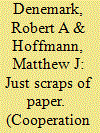

|
|
|
|
|
| Publication |
2008.
|
| Summary/Abstract |
Despite its importance in the global system, the literature provides little guidance on how treaty-making emerged as a well-accepted practice. In either assuming the appropriateness of treaty-making (and then analysing design) or treating treaties as strategic choices in the pursuit of gains (without analysing how treaties came to be a way to pursue gains), the current literature discounts the emergence and evolution of treaty-making. This lacuna contributes to a biased view of treaty-making as the epiphenomenal result of specific, ahistorical factors, rather than as a patterned, historical practice. We contend that the evolution of the practice of treaty-making is significant for questions of design/compliance, the future of multilateral interaction and global order. In addressing this concern, we pursue two linked goals. The first is self-consciously descriptive. We introduce a dataset of multilateral treaties that provides a novel picture of treaty-making across time, space and issue-areas. The second goal is explanatory. We develop and test a social constructivist and path-dependent explanation for the patterns of treaty-making evident in the data, especially 150 years of exponential growth, the spread of treaty-making across multiple issues and the diffusion of the practice across the world.
|
|
|
|
|
|
|
|
|
|
|
|
|
|
|
|
| 10 |
ID:
177620
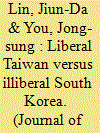

|
|
|
|
|
| Summary/Abstract |
South Korea and Taiwan have developed very different sets of election campaign regulations. While both countries had highly restrictive campaign rules during the authoritarian era, they have diverged since democratic transition. South Korea still imposes numerous restrictions on campaigning activities, but Taiwan has removed most of the restrictions. We explore the causes of these divergent trajectories through comparative historical process tracing, focusing on critical junctures and path dependence. We find that incumbency advantage and containment of new opposition parties were the primary objectives of introducing stringent regulations under the authoritarian regimes in both countries. The key difference was that, during the democratic transition, legislators affiliated with the opposition parties as well as the ruling party in South Korea enjoyed the incumbency advantage but that opposition forces in Taiwan did not. As a result, the opposition in Taiwan fought for liberalization of campaign regulations, but the South Korean opposition did not.
|
|
|
|
|
|
|
|
|
|
|
|
|
|
|
|
| 11 |
ID:
160006
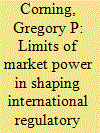

|
|
|
|
|
| Summary/Abstract |
What factors shape the ability of the United States to negotiate international regulatory cooperation? This paper discusses three theoretical approaches that help to explain the potential for regulatory change – market power, historical institutionalism, and loss avoidance – and applies them to the negotiation of regulatory issues in the Trans-Pacific Partnership (TPP). It seeks to understand why the regulatory disciplines in some TPP chapters were more rigorous than those in other chapters. Focusing on case-studies of the chapters on state-owned enterprises and regulatory coherence, the paper argues that the market power of the United States is more likely to secure stronger regulatory disciplines when there is: (1) a strong loss avoidance coalition in the USA pushing for change, and (2) a weakly institutionalized regulatory framework among parties in a given issue area that makes path dependence less important.
|
|
|
|
|
|
|
|
|
|
|
|
|
|
|
|
| 12 |
ID:
107234
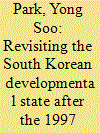

|
|
|
|
|
| Publication |
2011.
|
| Summary/Abstract |
This study reassesses the conventional wisdom surrounding the developmental state of South Korea (hereafter Korea) since the 1997 Korean financial crisis. The conventional wisdom is that, as a result of the continued structural reforms prompted by the crisis, the Korean developmental state, inherently characterised by active or direct state intervention, strong economic and industrial policies, the chaebol-oriented economic policy, and labour exclusion, has finally begun to dissolve in earnest. In this study, we have considered whether that is really the case and also which theoretical implications can be drawn from this consideration. Analysis of the Korean developmental state following the 1997 crisis has indicated that, quite contrary to conventional wisdom, the developmental state has continued to prevail as a core policy framework of the Korean administrations even after the crisis. There is no doubt that the continued structural and market reform after the crisis certainly undermined the Korean developmental state to a certain degree, but that does not mean the beginning of the end of the Korean developmental state at all. For much evidence strongly indicates that the Korean developmental state still remains intact and strong despite the structural reforms, on account of the successive Korean governments' assiduous and deliberate efforts to maintain and reinforce it. Even after the crisis, the Kim Dae-Jung and post-Kim regimes have hardly abandoned many of their market interventionist policies. Such market interventionist policies, which were routinely practised under the military regime in the 1960s and 1970s, diametrically contravene the argument that the Korean developmental state has begun to dissolve as a result of structural reform after the 1997 crisis. Contrary to conventional wisdom, the Korean developmental state persists as usual. All this information, then, suggests that path dependence is in action in the case of the Korean developmental state, and this suggests a further hypothesis that the Korean developmental state is very likely to persist in the future as well, despite increasing globalisation pressure, given the strong path dependence.
|
|
|
|
|
|
|
|
|
|
|
|
|
|
|
|
| 13 |
ID:
117667
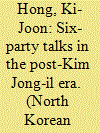

|
|
|
| 14 |
ID:
165130
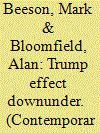

|
|
|
|
|
| Summary/Abstract |
Donald Trump’s election precipitated a debate in Australia about the value of retaining close alliance ties with the United States. Similar dynamics are discernible in other U.S. allies as the negative impact of Trump administration policies becomes clearer. Yet despite this “Trump effect,” we argue Australia is unlikely to distance itself from the United States because at the core of Australia’s strategic culture is a very positive “cultural orientation” toward the United States that is highly institutionalized in treaties, formal bilateral ties, Track 2 diplomacy, and public opinion. Such institutionalized ties have powerful path dependent effects. Accordingly, we conclude that the Trump effect does not constitute a powerful enough “exogenous shock” to move Australia off its well-worn grand-strategic path. But this alliance relationship is marked by both high cultural affinity and high institutionalization: American policy-makers should seriously consider whether other U.S. allies can tolerate similar levels of “stress.”
|
|
|
|
|
|
|
|
|
|
|
|
|
|
|
|
|
|
|
|
|